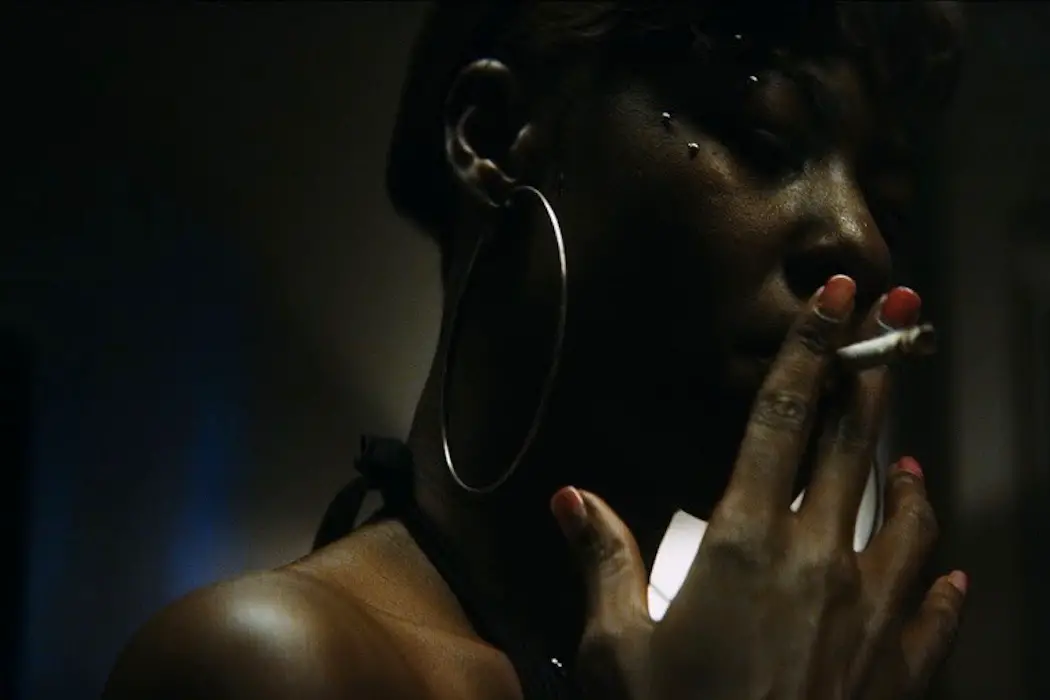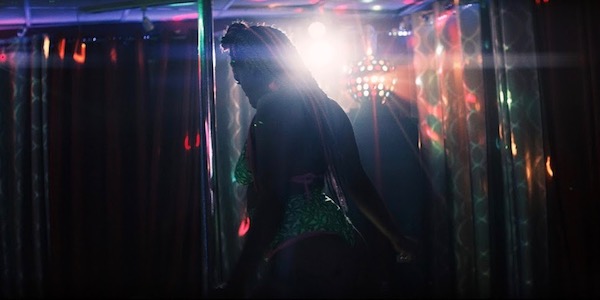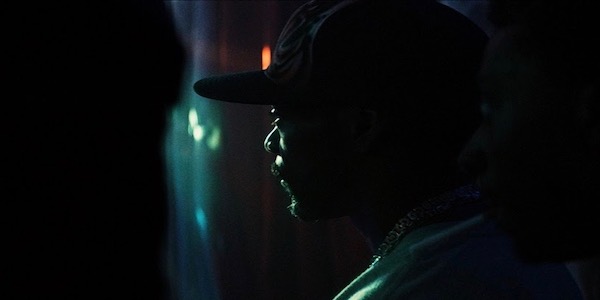A Life Unseen: Interview With HOLD ME DOWN Director Niclas Gillis & Star Tanisha Lambright

Laura Birnbaum is a proud film critic and writer from…
Based on true events from the life of Unique Adams, Hold Me Down is a drama short film following a day in the life of a 19-year-old single mother who works as a stripper at an illegal nightclub in the South Bronx to support her child. While the film follows a singular story, it is one that resembles the daily struggles of so many women who are societally prescribed to go down this path.
As with many issues involving women’s rights and their bodies, there exists a vast diversity of opinions surrounding views on sex work. Our society holds a long history of shaming those who, regardless of their own volition, support themselves or the ones around them by means of using sex or their sexuality. Regardless of your thoughts on this controversial issue, I think it important to make note of two things: first, that there is a distinct difference between sex work and forced prostitution (including the insolvent circumstances featured in Hold Me Down). And finally, (and in my own opinion), it is vital to acknowledge the vacancy of rights, recognition, and protection against the abuses by both the sex industry and the legal system alike.
The women featured in this film are not protected in these ways, but Hold Me Down absolutely recognizes and realizes the nature of their struggles. All the incredible actresses in the film are played by women who, either past or present, endure the same hardships as presented in the film, and the strip-club/brothel in which the scenes take place are quite real. The stories of women of color, women living in poverty, and women enduring abusive home lives (just to name a few) are often overlooked and deemed as “normal” or “part of the territory.” This film shows that the violence against women in this field is anything but. It’s a sobering film that sheds light on the concealed, overlooked, and ignored women in our country whose voices deserve to be heard.
“I want to stand up and be a voice for women where I come from… black women who suffer every day, everywhere.” –Tanisha Lambright
It cannot be overstated just how much the director, Niclas Gillis cares for his subjects. His focus is clear: honoring the women, their stories, and creating a platform on which they can tell those stores. Through the use of a very minimal color palate, dim lighting, and incredible tracking shots, you really feel like you are in the dark with the young woman at the focus. Her pain is palpable, and anyone with even the slightest empathetic inclination will find themselves hurting with her.
The film is unlike anything I’ve ever seen and warrants no critique. Hold Me Down features amazing performances, exemplary direction, and vehemently raises awareness to an issue that has been ignored for far too long. It is with great honor to share this powerful film with you here on Film Inquiry, and it was an honor to have had the chance to speak with those involved in the film’s creation.
Here is my interview with the director Niclas Gillis and the lead actress Tanisha Lambright.
Laura Birnbaum for Film Inquiry: Tanisha, thank you so much for being so honest and open about your experiences growing up and surviving through so many challenges. It was your vulnerability and candor as expressed in your interview that initially drew me to this film, and I sincerely thank you for that. What was your experience like working on this film?
Tanisha Lambright: Thank you so much. It was challenging emotionally and mentally, because I was still going through the exact same suffering in real life that the film shows. It was like every painful memory would be revisited, but I had to do it. Not only to help myself grow, but to be honest and true in my performance, and help raise awareness of these issues. We all go through the same things, and I want all my black women to know that they are not alone, that we are strong and that we matter.
Near the middle of the film, you gave a speech to your co-star, Tianna Allen, that had me moved to tears. How did the speech come into fruition? Did the act of saying those encouraging words from your character to another also speak to something or someone else in your life?
Tanisha Lambright: The scene with Tianna honestly came from the deepest part of my soul. I remember Niclas told me, “Tanisha, just be you,” and I just exploded in a way I never had before. It came from years of torment, abuse, suffering, struggling, and a lifetime of hopelessness. I felt her pain as a sister and I truly wanted to uplift her. She was a younger sister in my eyes; I saw a broken little girl, and I’ve been broken too.
Niclas, it is my understanding that you spent a considerable amount of time hearing stories from survivors, and wanted to keep the focus on them. Could you please speak about how you came to this story as a filmic narrative and how the larger concepts surrounding the exploitation of and violence against women moved you to create Hold Me Down?
Niclas Gillis: Absolutely. I moved from Sweden to New York when I was 19 years old. I ended up going to a predominantly African American college in Long Island and within three months I was invited to what I thought would be regular house party in Harlem, but that proved to be an underground prostitution event. I witnessed a young woman have sex with a stranger on the floor of a crowded room for single dollar bills, and was shocked.
We were the same age, and yet our realities seemed so far apart. When I asked her if she was okay, she told me that she had a two-year-old daughter and that this was what she had to do to survive. I couldn’t understand how a country like America could allow for a young mother to have to go through this to support her child, and I feared for what would become of her daughter.
“It had to feel as though nothing happened for the benefit of the audience, but that everything occurred autonomously, and that we merely got to witness it like a ghost drifting through.”
–Niclas Gillis
Most troubling of all was the realization that her predicament seemed to be so common. It prompted me to more seriously study American history and its bearings on the present day reality. The more I learned, the more troublesome the situation appeared. According to the Organization for Economic Co-operation and Development, there is almost no other country in the developed world in which the disparity between rich and poor is greater than it is here.
And in spite of the so called “American Dream”, a person born into poverty in America is less likely to make it out of poverty by adulthood than in almost any other developed nation. So five years later , I set out to make a film that I hoped would give the women who live that life the opportunity to tell their own story, to raise awareness of the conditions that they face, and inspire change.

There are some absolutely incredible one-take tracking shots throughout the film. What kind of impact do you feel those shots have on the viewer’s relation to the story being told?
Niclas Gillis: Thank you. I wanted you to be a witness , because as a witness you face a moral dilemma: to act or not to act. It couldn’t feel like a movie. Everything had to be real, and to be honest, it is. Aesthetically, the film had to be stripped of as much artifice as possible, and just employ the most ascetic language possible; stable, centered frames, minimal cutting, a restrained color palette, and a restricted access to information.
This last point is important. It had to feel like you were just coming upon this life that had been lived since long before the film started, and would continue long after it ended. It had to feel as though nothing happened for the benefit of the audience, but that everything occurred autonomously, and that we merely got to witness it like a ghost drifting through. It achieves a sort of nightmarish quality, and I think it lingers. The whole point is to make you not forget. When you go to bed tonight , I want you to think of Chastity, and all the women like her, who are still out there, who still need to be heard.
What kinds of films have influenced your perspective on the medium of film and what kinds of films are you most drawn to now?
Niclas Gillis: I would say that my influences mainly stem from American cinema in and around the 70’s, like Deliverance, Mean Streets, Taxi Driver, and Raging Bull ; mixed with Scandinavian masters like Bergman, Dreyer and Troell, and contemporary European films like Hunger, A Prophet, and Bullhead . I’m drawn to films that are restrained in their aesthetic, that preserve the mystery of life, and that show the beauty in human perseverance.
Films that depict perfect lives make me very nervous, because they make me feel like a total failure, like “I’ve never felt like that; and most likely, I never will”. But when I see works like the ones I just mentioned, I can identify. I can identify with Bobby Sands as he fights hopelessly against a system that will never change. I can identify with these characters, and it makes me appreciate life, and appreciate the struggle. They show, somehow, that life is hard and beautiful too.

Tanisha, what was it like to create and construct a narrative work in those very real spaces with other women survivors?
Tanisha Lambright: Understand that being in these very real places was nothing new to me. I’ve walked those stairwells, and I’ve been to every “after hour” spot there is in the Bronx. I was raped at the age of 16 and it was all hell from there. When turning our pain into performances for the film, I was proud to see us all be vulnerable, like we aren’t allowed to be in real life. We always have to defend ourselves, but we didn’t have to in this film. Niclas was always there for us. He really created an environment that made us feel safe to tell our stories.
This film comes to us at a time in which the world’s attitude toward sexual assault is, or is perceived to be, changing. Do you feel like people are becoming more receptive to the validity and prevalence of stories concerning the exploitation of women of color in light of the Me Too & Time’s Up movements?
Tanisha Lambright: To be quite frank, I feel like black women have always been used and abused and always told to just move on and accept it like it’s normal. Black women are still today more likely to be raped and murdered than any other woman in America. I don’t know a single female where I come from that hasn’t been raped or molested in their younger years.
But we don’t have a voice like these “Me Too” women do. Where is the media for us? What are we doing as a society to combat sexual abuse in the home or in the streets? I want to stand up and be a voice for women where I come from… black women who suffer every day, everywhere. With Hold Me Down, I want the world to know that we exist and that we matter too.
Niclas Gillis: I couldn’t agree more.
Watch the film now and listen to Tanisha and Tianna talk about their own lives at: https://vimeo.com/holdmedown
Does content like this matter to you?
Become a Member and support film journalism. Unlock access to all of Film Inquiry`s great articles. Join a community of like-minded readers who are passionate about cinema - get access to our private members Network, give back to independent filmmakers, and more.
Laura Birnbaum is a proud film critic and writer from Chicago. When she's not watching independent horror films, she's likely smoking a cigar on a rooftop somewhere, thinking about which indie horror film to watch next.













